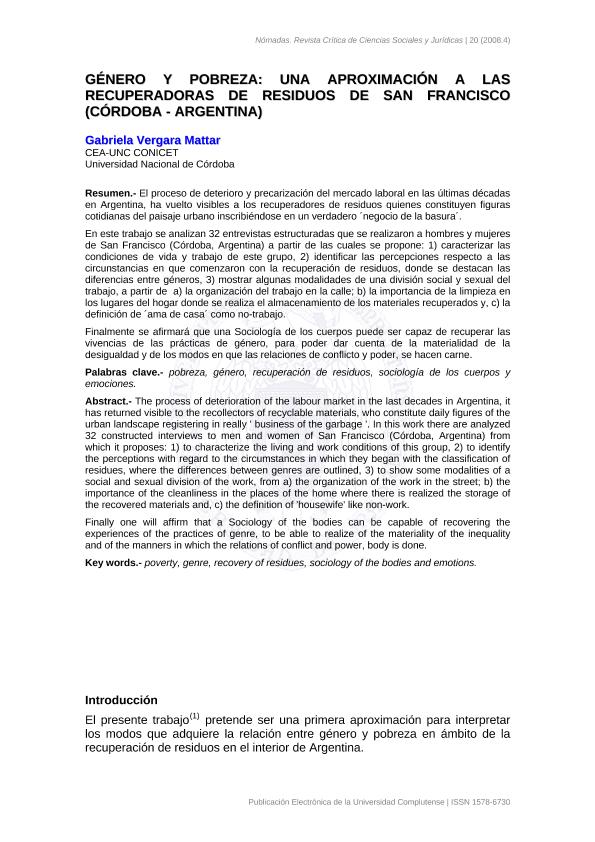Artículo
El proceso de deterioro y precarización del mercado laboral en las últimas décadas en Argentina, ha vuelto visibles a los recuperadores de residuos quienes constituyen figuras cotidianas del paisaje urbano inscribiéndose en un verdadero ´negocio de la basura´. En este trabajo se analizan 32 entrevistas estructuradas que se realizaron a hombres y mujeres de San Francisco (Córdoba, Argentina) a partir de las cuales se propone: 1) caracterizar las condiciones de vida y trabajo de este grupo, 2) identificar las percepciones respecto a las circunstancias en que comenzaron con la recuperación de residuos, donde se destacan las diferencias entre géneros, 3) mostrar algunas modalidades de una división social y sexual del trabajo, a partir de la organización del trabajo en la calle, la importancia de la limpieza en los lugares del hogar donde se realiza el almacenamiento de los materiales recuperados y la definición de ´ama de casa´ como no-trabajo. Finalmente se afirmará que una Sociología de los cuerpos puede ser capaz de recuperar las vivencias de las prácticas de género, para poder dar cuenta de la materialidad de la desigualdad y de los modos en que las relaciones de conflicto y poder se hacen carne. The process of deterioration of the labour market in the last decades in Argentina, it has returned visible to the recollectors of recyclable materials, who constitute daily figures of the urban landscape registering in really ' business of the garbage '. In this work there are analyzed 32 constructed interviews to men and women of San Francisco (Córdoba, Argentina) from which it proposes: 1) to characterize the living and work conditions of this group, 2) to identify the perceptions with regard to the circumstances in which they began with the classification of residues, where the differences between genres are outlined, 3) to show some modalities of a social and sexual division of the work, from a) the organization of the work in the street; b) the importance of the cleanliness in the places of the home where there is realized the storage of the recovered materials and, c) the definition of 'housewife' like non-work. Finally one will affirm that a Sociology of the bodies can be capable of recovering the experiences of the practices of genre, to be able to realize of the materiality of the inequality and of the manners in which the relations of conflict and power, body is done.
Género y pobreza: una aproximación a las recuperadoras de residuos de San Francisco (Córdoba - Argentina)
Fecha de publicación:
12/2008
Editorial:
Universidad Complutense de Madrid. Facultad de Ciencias Políticas y Sociología
Revista:
Nómadas
e-ISSN:
1578-6730
Idioma:
Español
Tipo de recurso:
Artículo publicado
Clasificación temática:
Resumen
Archivos asociados
Licencia
Identificadores
Colecciones
Articulos(CCT - CORDOBA)
Articulos de CTRO.CIENTIFICO TECNOL.CONICET - CORDOBA
Articulos de CTRO.CIENTIFICO TECNOL.CONICET - CORDOBA
Articulos(CIECS)
Articulos de CENTRO DE INVESTIGACIONES Y ESTUDIO SOBRE CULTURA Y SOCIEDAD
Articulos de CENTRO DE INVESTIGACIONES Y ESTUDIO SOBRE CULTURA Y SOCIEDAD
Citación
Vergara, Gabriela del Valle; Género y pobreza: una aproximación a las recuperadoras de residuos de San Francisco (Córdoba - Argentina); Universidad Complutense de Madrid. Facultad de Ciencias Políticas y Sociología; Nómadas; 20; 4; 12-2008; 1-14
Compartir




